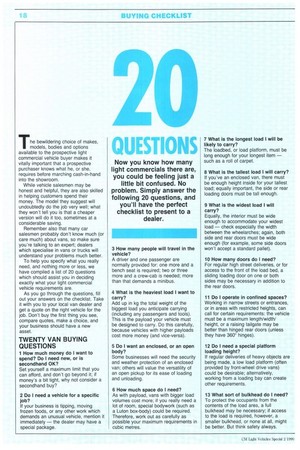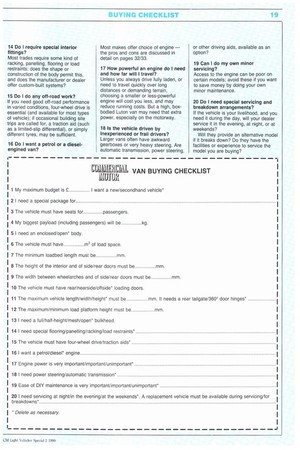20
Page 102

Page 103

If you've noticed an error in this article please click here to report it so we can fix it.
QUESTIONS
The bewildering choice of makes, models, bodies and options available to the prospective light commercial vehicle buyer makes it vitally important that a prospective purchaser knows what he, or she, requires before marching cash-in-hand into the showroom.
While vehicle salesmen may be honest and helpful, they are also skilled in helping customers spend their money. The model they suggest will undoubtedly do the job very well; what they won't tell you is that a cheaper version will do it too, sometimes at a considerable saving.
Remember also that many car salesmen probably don't know much (or care much) about vans, so make sure you're talking to an expert; dealers which specialise in vans or trucks will understand your problems much better.
To help you specify what you really need, and nothing more or less, we have compiled a list of 20 questions which should assist you in deciding exactly what your light commercial vehicle requirements are.
As you go through the questions, fill out your answers on the checklist. Take it with you to your local van dealer and get a quote on the right vehicle for the job. Don't buy the first thing you see, compare quotes, make a choice, and your business should have a new asset.
TWENTY VAN BUYING QUESTIONS
1 How much money do I want to spend? Do I need new, or is secondhand OK?
Set yourself a maximum limit that you can afford, and don't go beyond it; if money's a bit tight, why not consider a secondhand buy?
2 Do I need a vehicle for a specific job?
If your business is tipping, moving frozen foods, or any other work which demands an unusual vehicle, mention it immediately — the dealer may have a special package. 3 How many people will travel in the vehicle?
A driver and one passenger are normally provided for: one more and a bench seat is required; two or three more and a crew-cab is needed; more than that demands a minibus.
4 What is the heaviest load I want to carry?
Add up in kg the total weight of the biggest load you anticipate carrying (including any passengers and tools). This is the payload your vehicle must be designed to carry. Do this carefully, because vehicles with higher payloads cost more money (and vice-versa).
5 Do I want an enclosed, or an open body?
Some businesses will need the security and weather protection of an enclosed van; others will value the versatility of an open pickup tor its ease of loading and unloading.
6 How much space do I need? As with payload, vans with bigger load volumes cost more; if you really need a lot of room, special bodywork (such as a Luton box-body) could be required. Therefore, work out as carefully as possible your maximum requirements in cubic metres. 7 What is the longest load I will be likely to carry?
The loadbed, or load platform, must be long enough for your longest item — such as a roll of carpet.
8 What is the tallest load I will carry? If you've an enclosed van, there must be enough height inside for your tallest load; equally important, the side or rear loading doors must be tall enough, 9 What is the widest load I will carry?
Equally, the interior must be wide enough to accommodate your widest load — check especially the width between the wheelarches; again, both side and rear doors must be wide enough (for example, some side doors won't accept a standard pallet).
10 How many doors do I need? For regular high street deliveries, or for access to the front of the load bed, a sliding loading door on one or both sides may be necessary in addition to the rear doors.
11 Do I operate in confined spaces? Working in narrow streets or entrances, or in areas with restricted heights, can call for certain requirements: the vehicle must be a maximum length/width/ height, or a raising tailgate may be better than hinged rear doors (unless they have 360 hinges).
12 Do I need a special platform loading height?
If regular deliveries of heavy objects are being made, a low load platform (often provided by front-wheel drive vans) could be desirable; alternatively, working from a loading bay can create other requirements.
13 What sort of bulkhead do I need? To protect the occupants from the contents of the load area, a full bulkhead may be necessary; if access to the load is required, however, a smaller bulkhead, or none at all, might be better. But think safety always. 14 Do I require special interior fittings?
Most trades require some kind of racking, panelling, flooring or load restraints: does the shape or construction of the body permit this, and does the manufacturer or dealer offer custom-built systems?
15 Do I do any off-road work? If you need good off-road performance in varied conditions, four-wheel drive is essential (and available for most types of vehicle); if occasional building site trips are called for, a traction aid (such as a limited-slip differential), or simply different tyres, may be sufficient.
16 Do I want a petrol or a dieselengined van? Most makes offer choice of engine — the pros and cons are discussed in detail on pages 32/33.
17 How powerful an engine do I need and how far will I travel?
Unless you always drive fully laden, or need to travel quickly over long distances or demanding terrain, choosing a smaller or less-powerful engine will cost you less, and may reduce running costs. But a high, boxbodied Luton van may need that extra power, especially on the motorway.
18 Is the vehicle driven by inexperienced or frail drivers? Larger vans often have awkward gearboxes or very heavy steering. Are automatic transmission, power steering, or other driving aids, available as an option?
19 Can I do my own minor servicing?
Access to the engine can be poor on certain models; avoid these if you want to save money by doing your own minor maintenance.
20 Do I need special servicing and breakdown arrangements?
If the vehicle is your livelihood, and you need it during the day, will your dealer service it in the evening, at night, or at weekends?
Will they provide an alternative model if it breaks down? Do they have the facilities or experience to service the model you are buying?
















































































































